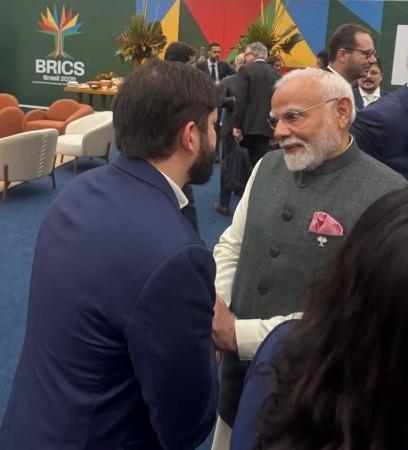
Prime Minister Narendra Modi's recent participation in the BRICS Summit in Rio de Janeiro, Brazil, marked a significant moment in international diplomacy. The summit, which concluded late Monday night, India time, provided a platform for Modi to engage with world leaders and strengthen bilateral ties. Among the key figures he met were the President of Chile, the United Nations Secretary General, and the former President of Brazil. These interactions underscored India's strategic approach to international relations, emphasizing multilateralism and economic cooperation.
During the summit, Prime Minister Modi met with Chilean President Gabriel Boric Font, highlighting the growing friendship between India and Chile. Modi expressed his delight in meeting President Boric Font, stating, "Delighted to have met President Gabriel Boric Font of Chile during the Rio BRICS Summit. India-Chile friendship is getting stronger and stronger!"
This meeting underscored the deepening ties between the two nations, which have been building since the establishment of diplomatic relations in 1949. In April, President Boric Font visited India with a high-level delegation, marking 76 years of diplomatic relations and discussing various aspects of their bilateral relationship, including trade, cultural ties, and people-to-people linkages.
First Indian PM to visit Brazil in nearly 60 yrs
— BALA (@erbmjha) July 8, 2025
Bhavya Swaagat of PM Modi in Brasilia --- something that a puppet PM could never achieve ? pic.twitter.com/pVLamwLUn4
The BRICS Summit also provided an opportunity for Modi to engage with United Nations Secretary General Antonio Guterres. Modi emphasized India's commitment to multilateralism and dialogue as essential tools for addressing global challenges such as peacebuilding, sustainable development, climate change, and human rights.
He stated, "Interacted with Mr. Antonio Guterres, UN Secretary General, on the sidelines of the BRICS Summit in Rio de Janeiro yesterday." This interaction highlighted India's active role in the United Nations and its dedication to comprehensive reform, including the reform of the Security Council.
Strengthening Bilateral Ties and Economic Cooperation
Another significant meeting during the summit was with Dilma Rousseff, the former President of Brazil and current President of the New Development Bank (NDB). Modi described the interaction as productive, focusing on the progress made by the 'BRICS Bank' and discussing reforms of global financial institutions within the BRICS framework. The New Development Bank, established by BRICS countries, aims to support infrastructure and sustainable development projects in member countries and other emerging economies.

Following the BRICS Summit, Prime Minister Modi was warmly welcomed by Brazilian President Luiz Inacio Lula da Silva at the Alvorada Palace in Brasilia. This state visit included a ceremonial welcome with military honors, a meeting in a restricted format, and delegation-level talks. The visit aimed to further strengthen the bilateral relationship between India and Brazil, focusing on political, economic, scientific, technological, and cultural cooperation. The two countries have a history of collaboration, with India being one of Brazil's largest trading partners. In 2024, bilateral trade between the two nations totaled $12 billion, with India being a significant destination for Brazilian exports and a major source of imports for Brazil.
The interactions at the BRICS Summit and the subsequent state visit to Brazil reflect India's strategic approach to international relations, emphasizing the importance of multilateralism, economic cooperation, and cultural exchange. These engagements are part of India's broader foreign policy strategy, which seeks to build strong partnerships with countries across the globe, particularly in the Global South. By engaging with world leaders and strengthening bilateral ties, India is positioning itself as a key player on the global stage, committed to multilateralism, economic cooperation, and cultural exchange.

















